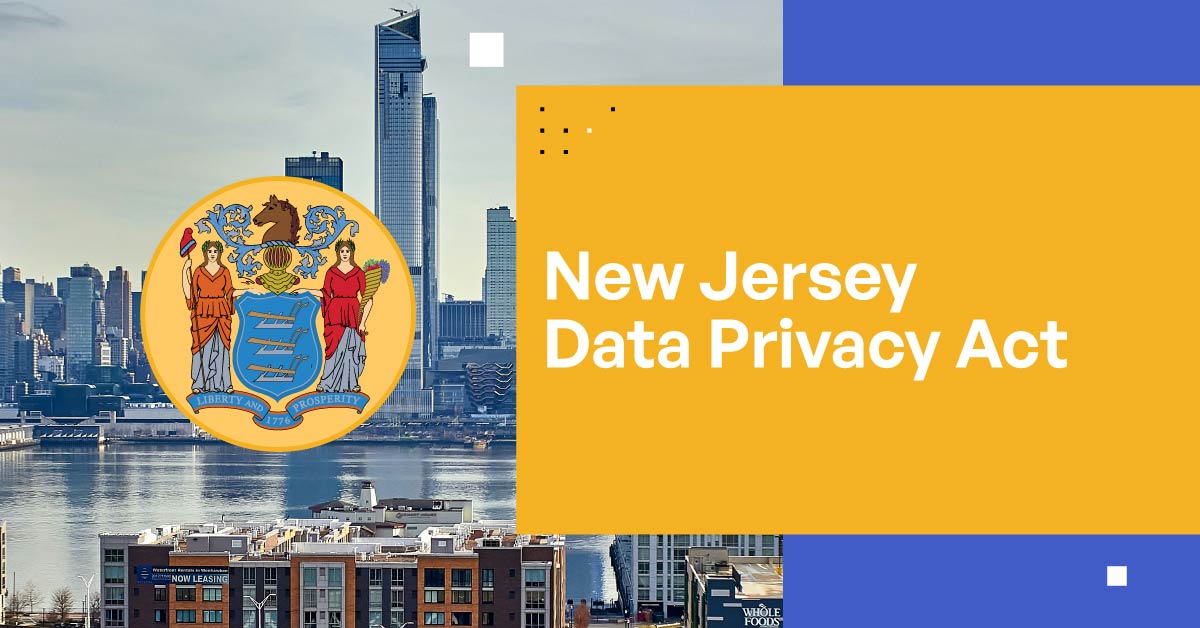Get to Know the New Jersey Data Privacy Act
In the rapidly evolving digital landscape, the recently enacted New Jersey Data Privacy Act serves as a key policy instrument in preserving the integrity of personal data. This valuable legislation provides a robust framework for businesses in protecting consumer data, mandates adherence to specific compliance requirements and promotes transparency in the processing and handling of personal data.

This comprehensive guide aims to provide an attentive overview of the New Jersey Data Privacy Act, its origins, structure, benefits, challenges and compliance requirements.
Origin of the New Jersey Data Privacy Act
In response to rising cybersecurity threats and data privacy concerns, the New Jersey Data Privacy Act was enacted to bolster the protection and control individuals have over their personal data. Emerging during a time marked by significant data breaches and revelations of questionable data practices, the act was passed in January 2024 to address these daunting challenges and ensure businesses are held accountable for their data handling processes. From its inception, the act has continuously evolved to accommodate technological advancements and meet the growing needs of digital consumers and businesses.
The evolution of the act largely reflects the dynamic digital environment. Key milestones include amendments to include provisions for biometric data, tracking technologies and expansion of the scope to cover new business models. As cybersecurity threats become more complex and technology continues to advance, the act is expected to evolve further to meet these challenges.
Key Elements of the New Jersey Data Privacy Act
The construction of the New Jersey Data Privacy Act is designed to promote accountability, transparency and control over personal data. The act comprises key elements that mandate businesses to provide clear disclosures on their data practices, obtain explicit consent before data collection, and provide individuals with the right to access, correct, and delete their personal data. It also includes provisions for the protection of children’s data and mandates security measures to prevent data breaches.
Let’s take a closer look at each:
Clear Disclosures on Data Practices
The New Jersey Data Privacy Act requires businesses to be transparent about their data practices. This includes revealing what type of data is gathered, why it’s collected, how it’s used, and who it’s shared with. This ensures that users are fully informed about how their data is handled and can make knowledgeable decisions about using the service.
Obtain Explicit Consent
Before collecting data, businesses must secure explicit consent from individuals. This usually comes in the form of a clear and understandable request to which the user can either agree or disagree. The New Jersey Data Privacy Act emphasizes that consent must be knowingly and freely given, meaning users should have a real choice in the matter.
Right to Access, Correct, and Delete Personal Data
Under the New Jersey Data Privacy Act, individuals can access and review their data that a business collects. Furthermore, if they find inaccuracies in the information held, they have the right to request corrections. These provisions enhance control over one’s own data. Moreover, individuals can ask for their data to be deleted, reflecting the principles of the "right to be forgotten."
Protection of Children’s Data
The Act also includes special provisions for the protection of children’s data. It necessitates companies to take extra precautions when dealing with data that could potentially identify children. This includes obtaining parental or guardian consent for the collection of children’s data, and additional safeguards to ensure this sensitive information is secure.
Mandated Security Measures to Prevent Data Breaches
The New Jersey Data Privacy Act mandates businesses to implement appropriate security measures to prevent data breaches. These measures should be able to protect user data from unauthorized access, accidental loss, or alteration. It’s a way to demonstrate that a business values its users’ data and is actively working to protect it.
Benefits to Organizations
The New Jersey Data Privacy Act positively impacts businesses by establishing a clear standard for handling personal data, fostering consumer trust and promoting ethical data practices. With defined guidelines on data handling and processing, businesses can avoid ambiguity and ensure their data practices are in compliance with the law.
Moreover, diligent adherence to the act’s mandates creates a reputation of trust and integrity among consumers, strengthening the customer–business relationship. Organizations can also mitigate the risk of reputational damage and financial penalties arising from data breaches or non–compliance by implementing the robust security measures prescribed by the act.
Benefits to Consumers
For consumers, the New Jersey Data Privacy Act serves as a powerful tool ensuring control over their personal data. It provides consumers with rights to access and delete their data, as well as the ability to opt–out of the sale or sharing of their data. These rights empower consumers to control how their personal data is used and processed.
In addition, the act contributes to maintaining a transparent digital environment by requiring businesses to provide clear and comprehensive privacy policies. This transparency helps consumers make informed decisions about their interactions with businesses and their personal data.
Compliance Requirements and Risks of Non–compliance
The New Jersey Data Privacy Act is a comprehensive piece of legislation that includes a variety of stringent compliance requirements for businesses. This Act, which is focused primarily on the privacy and protection of consumer data, necessitates that organizations operate under a tight regimen of rules and regulations concerning their business’s handling of data.
One of the most crucial compliance requirements of this Act is the need for businesses to keep meticulous records of their data processing activities. This involves documenting every single data–related operation, including the collection, storage, use, and disposal of data. This requirement ensures that businesses have a clear understanding of where, how, and why data is being used in their operations, enabling them to identify and address any potential issues promptly.
In addition, the Act also mandates businesses to implement reasonable security measures to protect consumer data. These measures can include various data protection practices, such as encrypting sensitive information, using robust firewalls, installing antivirus software, and regularly updating systems. The aim behind this obligation is to minimize the risk of data breaches, thereby offering consumers greater assurance that their personal data is secure.
The New Jersey Data Privacy Act also insists that organizations craft and provide comprehensive privacy policies. This means that businesses should not only devise policies outlining their data handling practices but also ensure these policies are easily accessible and understandable to customers. These privacy policies should detail the type of data collected, the purpose of collection, how the data is protected, and the rights customers have in relation to their data.
Moreover, under this act, businesses are required to respond swiftly to consumer requests related to their personal data. Whether a consumer is seeking to access, correct, or delete their data, businesses must take immediate action, fostering trust between the organization and its consumers. This provision also underscores the right of consumers to control their own personal information – a core principle of the New Jersey Data Privacy Act.
Failure to adhere to the stipulations of the act can lead to substantial consequences, including robust financial penalties that could seriously affect a company’s bottom line. Moreover, a company could suffer reputational damage, which can have a far–reaching impact on its customer base and overall market standing. Potential lawsuits are another risk, which could drain resources, time, and further damage the company’s image.
These significant risks associated with non–compliance underscore the critical necessity for businesses to thoroughly ensure their data practices are in strict alignment with the act’s mandates. Companies should be proactive in regularly reviewing their data practices, making necessary adjustments, and educating their staff on the act’s requirements to avoid any potential non–compliance issues.
Political Challenges and Future Amendments
Despite its inherent benefits, the New Jersey Data Privacy Act does have some detractors. For instance, there may be concerns from business entities fearing additional expenses to meet the Act’s compliance requirements. They may have apprehensions about the financial and operational burden the Act’s implementation could impose.
On the other hand, privacy advocates could express dissatisfaction, arguing that the Act does not provide sufficient protection to the citizens of New Jersey. They might believe that the Act needs to adopt more stringent measures to truly safeguard the data privacy rights of the individuals. Moreover, there could be other critics who could have varying perspectives and concerns about the Act. They might range from political challenges due to the contentious nature of privacy to the potential implications for law enforcement and national security. Balancing data privacy needs with law enforcement necessities can be a sensitive topic, with shifts in new legislative changes or amendments potentially favoring one over the other.
The dynamic nature of the digital world requires the New Jersey Data Privacy Act to be flexible and adaptable. As technology and consumer behaviors evolve, the act must continue to evolve alongside them to remain relevant and effective. Future amendments to the act are likely to address these evolving challenges and continue to protect consumer data privacy.
Kiteworks Helps Organizations Comply With the New Jersey Data Privacy Act
The New Jersey Data Privacy Act represents a pivotal move in data privacy legislation. From its inception, it aimed to provide robust protections for personal data in an increasingly digital society. By mandating transparency and accountability in data handling and processing, it grants both consumers and organizations significant benefits, fostering trust and promoting ethical data practices.
The Kiteworks Private Content Network, a FIPS 140-2 Level validated secure file sharing and file transfer platform, consolidates email, file sharing, web forms, SFTP and managed file transfer, so organizations control, protect, and track every file as it enters and exits the organization.
With Kiteworks, businesses utilize Kiteworks to share confidential personally identifiable and protected health information (PII/PHI), customer records, financial information, and other sensitive content with colleagues, clients, or external partners. Because they use Kiteworks, they know their sensitive data and priceless intellectual property remains confidential and is shared in compliance with relevant regulations like GDPR, HIPAA, U.S. state privacy laws, and many others.
Kiteworks deployment options include on-premises, hosted, private, hybrid, and FedRAMP virtual private cloud. With Kiteworks: control access to sensitive content; protect it when it’s shared externally using automated end-to-end encryption, multi-factor authentication, and security infrastructure integrations; see, track, and report all file activity, namely who sends what to whom, when, and how. Finally demonstrate compliance with regulations and standards like GDPR, HIPAA, CMMC, Cyber Essentials Plus, NIS2, and many more.
To learn more about Kiteworks, schedule a custom demo today.

